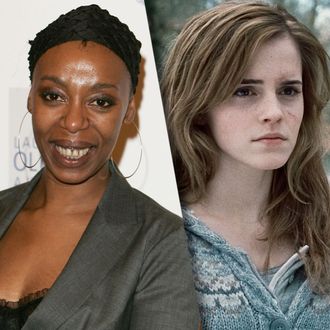
J.K. Rowling is more devoted to her fans than most authors: She can regularly be found on Twitter answering questions and weighing in on all things Potter. Frequently, she’s been asked about things that weren’t included in the books — like characters’ backstories, the sexual orientation of Hogwarts students, and the racial identities of supporting characters. Although the textual evidence suggests that the world of Hogwarts is predominantly white and straight, this gives Rowling the opportunity to effectively rewrite the Potter canon to emphasize diversity. Thus, she’s dispensed post-canonical reveals like: Hogwarts had LGBT students; Dumbledore himself was gay; and there were Jewish students at Hogwarts. At this point, no one would bat an eye if Rowling were to tweet, “I just saw Tangerine and it reminded me that there were trans students at Hogwarts!”
On the one hand, this can read as too convenient and, at times, pandering. But on the other hand, it can help lead to things like yesterday’s exciting news that black actress Noma Dumezweni has been cast as Hermione Granger in the upcoming London theater production Harry Potter and the Cursed Child. This is an important expansion of the Potter universe, so much so that it does a disservice to Dumezweni to even refer to it as “fan service” — meaning, giving the audience exactly what it wants. But in the strange world of Rowling fandom, it’s also hard not to see it as such.
Fans have been imagining Hermione as black for years now, despite the bare minimum of evidence in the books. In the Harry Potter text, Hermione’s race is never specified. The only direct indication is in the third installment, Harry Potter and the Prisoner of Azkaban, where Hermione is described as “very brown” in contrast to a freckly Ron Weasley. Granted, if Rowling really thought Hermione was black, maybe she wouldn’t have been cast as Emma Watson in the films — but it’s easy to understand why this was enough for black readers, searching for representation in the mostly white universe of young-adult fiction, to imagine the character to be like themselves.
On Tumblr, the preeminent venue for fanfiction of all types today, this has led to gorgeous fan art that reimagines Hermione as black, instead of the image of Watson. If you scan Tumblr long enough, you’ll also find beautiful renderings of Miles Morales (the half-black, half-Latino Spider-Man in the comic universe that has yet to appear onscreen) or straight characters involved in homosexual relationships like Hannibal’s Will Graham and Hannibal Lecter or The Force Awakens’ Finn and Poe Dameron.
“Racebending” like this sometimes leads to backlash — John Boyega faced criticism for taking a prominent role in The Force Awakens and Amandla Stenberg received hate for portraying Rue in The Hunger Games (even though that character is literally described as black in the books). Even though Hollywood still defaults to casting white actors in nonwhite roles — Watson as Hermione, the entire cast of the film 21, or Scarlett Johansson in the upcoming adaptation of Japanese comic Ghost in the Shell, for example — the very idea that important characters in fiction don’t have to be white is still unacceptable for way too many people.
“Fan service” has become more and more predominant in this social-media age, when the feedback loop between creator and audience is so immediate. But rarely does it lead to actual results, like Dumezweni’s casting, beyond the precincts of Tumblr and fan art. This is why Rowling deserves credit for responding to fans who were upset with Dumezweni’s casting, saying that she loves the idea of a black Hermione, if not enough to actually write it herself. (More typical is the response of Tina Fey to criticism of race in Unbreakable Kimmy Schmidt over the weekend, saying she’s “steer[ing] clear” of the internet’s “culture of demanding apologies.”) Cursed Child might very well only be seen by a small population of Harry Potter’s fans, but the news of this casting travels across the Potterverse in general. So now that her advocacy has become action, maybe Rowling will follow up Cursed Child with a Harry Potter prequel that provides actual text evidence that Dumbledore was gay? I want to see the receipts.

